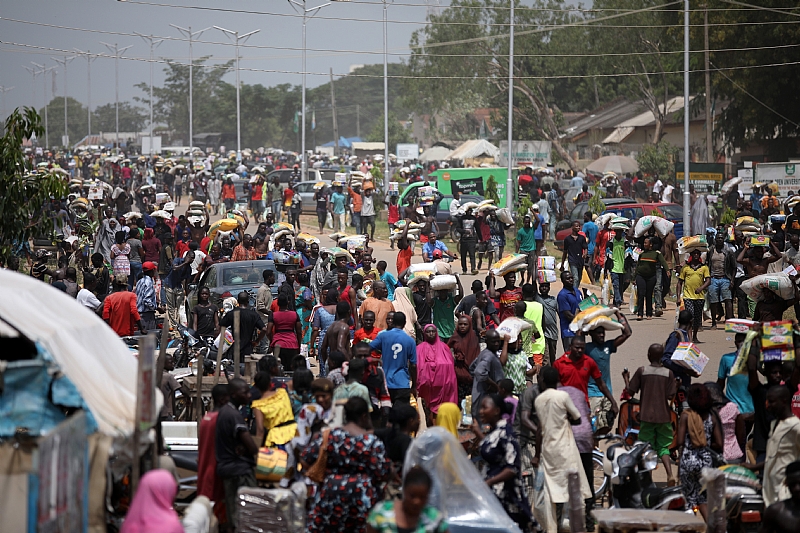
[ad_1]
The cost of the coronavirus pandemic to physical health and life around the world is enormous. But the disease and the lockdown measures have also had an impact on mental health.
Some of the mental health problems that have been reported due to COVID-19 include anxiety, depression, anger, confusion, insomnia, post-traumatic disorders, boredom, loneliness, and adjustment issues.
The phases of the COVID-19 lockdown in Nigeria lasted between the beginning of May 2020 and the end of July 2020. Movement was restricted during this period. Gradually, the lockdown was eased, but a curfew was introduced from 8 pm to 6 am in the country’s main cities to reduce the spread of the virus.
To our knowledge, no previous research had examined the influence of sociodemographic characteristics on mental health among Nigerians during the COVID-19 lockdown. That is why we set out to study the effects of some of these variables on successful coping, stress, and self-esteem.
Findings about which categories of people struggled the most with their mental health under lockdown could inform interventions to make sure their needs are being met.
Demographic variables and aspects of mental health
The sociodemographic variables that we considered in the study were gender, marital status, religion, ethnicity, educational level, and employment status. The facets of mental health that we analyzed were coping, stress, and self-esteem.
We collected information for the study through an online questionnaire in Nigeria. Most of the 353 people, between the ages of 18 and 65, who responded were from the southwest of the country and had access to smartphones and social media.
This means that the findings may not represent people from lower income groups or other geopolitical areas of the country. The majority of our respondents (63%) were male and the majority belonged to the three main ethnic groups in Nigeria: Yoruba, Igbo and Hausa.
The questionnaire asked respondents if they agreed or disagreed or were undecided on 12 statements related to their mental health. These were statements such as “I lose a lot of sleep because of worry”, “I have felt unhappy and depressed” and “I have lost confidence in myself.”
Who was the best fit and in what way
We found that different categories of people reported psychological impacts during the COVID-19 lockdown. The Yoruba ethnic group in the southwestern region of Nigeria coped better with the situation than other ethnic groups. The Igbo, in the southeastern region, were not as concerned compared to other ethnic groups. But the Yoruba had more positive views of themselves than other ethnic groups.
Accessibility to quality mental health services differs by region, so we consider ethnicity to be relevant in our research.
We also look at educational achievements. We found that people who had obtained a graduate education adjusted better and had a more positive view of themselves compared to others. We found that people who had completed high school seemed to worry less during this period. The self-employed in Nigeria were able to adjust well, while the unemployed were more concerned and had a low opinion of themselves.
Married people adapted well; they were less concerned and had more positive views of themselves than singles. Married women coped better than married men. Single men adjusted better than single women.
Regarding the employment situation, wage earners were less concerned and had a more positive view of themselves than the self-employed or unemployed. Self-employed men were better suited to the situation than wage-earning men and women, as well as unemployed men and women and self-employed women.
The single self-employed were more anxious than the unemployed married and single, the salaried single or married, and the self-employed married.
Looking to the future
Generally, our research findings led to some interesting revelations. We found that men and women suffered from mental health problems during the COVID-19 pandemic, contradicting the findings of studies conducted elsewhere. According to other studies, people’s mental health differed according to their marital status, education, and employment status.
As Nigeria continues to grapple with the challenges of COVID-19, it is worth noting that the categories of people who are most susceptible to psychological problems in these circumstances are the single, the unemployed, the least educated, and those from northern parts of the world. country. country. These people must receive due attention in intervention programs.
Dr. Abiodun Musbau Lawal does not work, consult, own shares, or receive funds from any company or organization that benefits from this article, and has disclosed no relevant affiliations beyond his academic appointment.
By Dr. Abiodun Musbau Lawal, Professor, Department of Psychology, Federal University, Oye Ekiti![]()